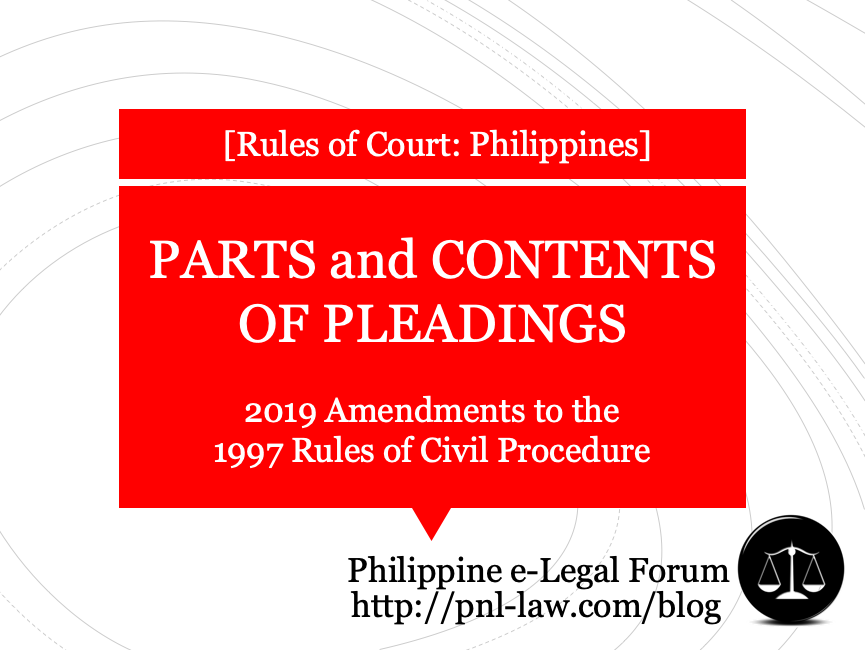


A pleading must contain: (a) a caption, setting forth the name of the court, the title of the action, and the docket number if assigned; and (b) the body, setting forth the designation of the pleading, the allegations of the party’s claims or defenses, the relief prayed for, and the date of the pleading. The rules governing the parts and contents of pleadings, including the amendments introduced in 2019, are discussed below.

There are significant changes made in the 2019 Proposed Amendments to the 1997 Rules of Civil Procedure (hereinafter, “2019 Amendments”), which takes effect on 1 May 2020. This is a summary/discussion of Rule 7. The summary of the other Rules can be tracked through the Menu.
The most significant revisions under the 2019 Amendments pertain to: (a) the additional responsibilities, as well as administrative and monetary liabilities, of the counsel who signs the pleading; (b) the new requirements on verification; and (c) the required contents of the pleading, including the incorporation of evidentiary matters previously reserved for the pre-trial brief.
The rule is the same that every pleading and other written submissions to the court must be signed by the party or counsel representing him/her. The 1997 Rules provides that the signature of counsel constitutes a certificate by him that he has read the pleading; that to the best of his knowledge, information, and belief there is good ground to support it; and that it is not interposed for delay.
This has been expanded in the 2019 Amendments. The counsel’s signature constitutes a certification that he/she has read the pleading AND the documents attached thereto, and that the counsel’s belief is formed after a reasonable inquiry. The whole section now provides that the signature of counsel constitutes a certificate by him/her that he/she has read the pleading and document; that to the best of his/her knowledge, information, and belief, formed after an inquiry reasonable under the circumstances:
Liability of lawyer, law firm, or party
If the court determines, on motion or motu proprio and after notice and hearing, that this rule has been violated, it may impose an appropriate sanction or refer such violation to the proper office for disciplinary action, on any attorney, law firm, or party that violated the rule, or is responsible for the violation.
Absent exceptional circumstances, a law firm shall be held jointly and severally liable for a violation committed by its partner, associate, or employee.
The sanction may include, but shall not be limited to, non-monetary directive or sanction; an order to pay a penalty in court; or, if imposed on motion and warranted for effective deterrence, an order directing payment to the movant of part or all of the reasonable attorney’s fees and other expenses directly resulting from the violation, including attorney’s fees for the filing of the motion for sanction.
The lawyer or law firm cannot pass on the monetary penalty to the client.
Under the 1997 Rules, a pleading is verified by an affidavit that the affiant has read the pleading and that the allegations therein are true and correct of his knowledge and belief. This is now insufficient.
Under the 2019 Amendments, a pleading is verified by an affidavit of an affiant duly authorized to sign said verification and shall allege the following attestations:
The signature of the affiant shall further serve as a certification of the truthfulness of the allegations in the pleading.
The authorization of the affiant to act on behalf of a party, whether in the form of a secretary’s certificate or a special power of attorney, should be attached to the pleading.
A pleading required to be verified that contains a verification based on “information and belief,” or upon “knowledge, information and belief,” or lacks a proper verification, shall be treated as an unsigned pleading.
Section 3 reproduced the caption (“Signature and Address”) in the 1997 Rules, but there are two notable omissions under the 2019 Amendments: (a) there is no provision that the address, which must not be a post office box, must be stated in the pleading; and (b) there is no provision that “[a]n unsigned pleading produces no legal effect”.
The 2019 Amendments reproduces the required contents of the pleading’s body under the 1997 Rules. The body of the pleading sets forth its designation, the allegations of the party’s claims or defenses, the relief prayed for, and the date of the pleading.
In addition to the foregoing, the 2019 Amendments now requires that a pleading which alleges a party’s claims or defenses must also state the following:
These matters are properly included in the pre-trial brief in the old rules. These are not required under the 1997 Rules because only the ultimate facts must be included in the pleading, “omitting the statement of mere evidentiary facts”. The 2019 Amendments removed this line and now requires that both the ultimate facts and the evidence must be set forth in the pleading.
The requirements and form under the 1997 Rules, pertaining to the certification against forum shopping, are the same with the 2019 Amendments. There is, however, an additional provision that “[t]he authorization of the affiant to act on behalf of a party, whether in the form of a secretary’s certificate or a special power of attorney, should be attached to the pleading”.

Atty. Fred Pamaos is a member of P&L Law (click on photo/name for profile). No legal advice is given in this forum. For other questions, use the "Contact Us" link.
